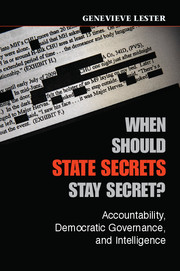Book contents
- Frontmatter
- Dedication
- Contents
- Acknowledgments
- Abbreviations
- 1 An Analytical Approach: Intelligence, Accountability, and Oversight
- 2 Organizing Secrecy: The CIA and Institutional Control
- 3 External Accountability: The Development of Congressional Oversight
- 4 Congress and Oppositional Oversight
- 5 An Independent Judiciary? The Domestic Implications of Intelligence and the Politics of Secret Oversight
- 6 Conclusions and Adapting Oversight Mechanisms for the Future
- Bibliography
- Index
5 - An Independent Judiciary? The Domestic Implications of Intelligence and the Politics of Secret Oversight
Published online by Cambridge University Press: 05 May 2015
- Frontmatter
- Dedication
- Contents
- Acknowledgments
- Abbreviations
- 1 An Analytical Approach: Intelligence, Accountability, and Oversight
- 2 Organizing Secrecy: The CIA and Institutional Control
- 3 External Accountability: The Development of Congressional Oversight
- 4 Congress and Oppositional Oversight
- 5 An Independent Judiciary? The Domestic Implications of Intelligence and the Politics of Secret Oversight
- 6 Conclusions and Adapting Oversight Mechanisms for the Future
- Bibliography
- Index
Summary
This concept of “national defense” cannot be deemed an end in itself, justifying any exercise of … power designed to promote such a goal. Implicit in the term “national defense” is the notion of defending those values and ideals, which set this Nation apart. For almost two centuries, our country has taken singular pride in the democratic ideals enshrined in its Constitution. It would indeed be ironic if, in the name of national defense, we would sanction the subversion of those liberties, which make the defense of the Nation worthwhile.
Supreme Court Chief Justice Earl WarrenYou have no civil liberties if you're dead.
Senator Pat Roberts (R–KS)Very few issues regarding intelligence and accountability have come so suddenly into public view as the role of judiciary and its role in the oversight of intelligence. This began with questions about decisions made during the George W. Bush administration, when changes to the statutory framework were implemented in the name of expeditiousness and executive authority. This concern also increased under the Obama administration, as the breadth, depth, and targets of domestic surveillance programs became publicly known because of extensive leaks. Most recently, the Edward Snowden leaks have led to wide-ranging consideration of whether the National Security Agency (NSA) programs described in his leaked materials are legal, and if so, how; and if vetted through the Foreign Intelligence Surveillance Court, how were the legal questions answered? Concern about the legality of statutory changes and effectiveness of intelligence oversight in the judiciary has significant merit, and the discourse about it has always been extremely polarizing. The concern tends to be due to a lack of clarity and information and an absence of balance in the narratives regarding this issue.
Technological advances and the characteristics of conflict with non-state actors have forced changes in judicial oversight that are not present to the same degree in congressional oversight.
- Type
- Chapter
- Information
- When Should State Secrets Stay Secret?Accountability, Democratic Governance, and Intelligence, pp. 159 - 204Publisher: Cambridge University PressPrint publication year: 2015



